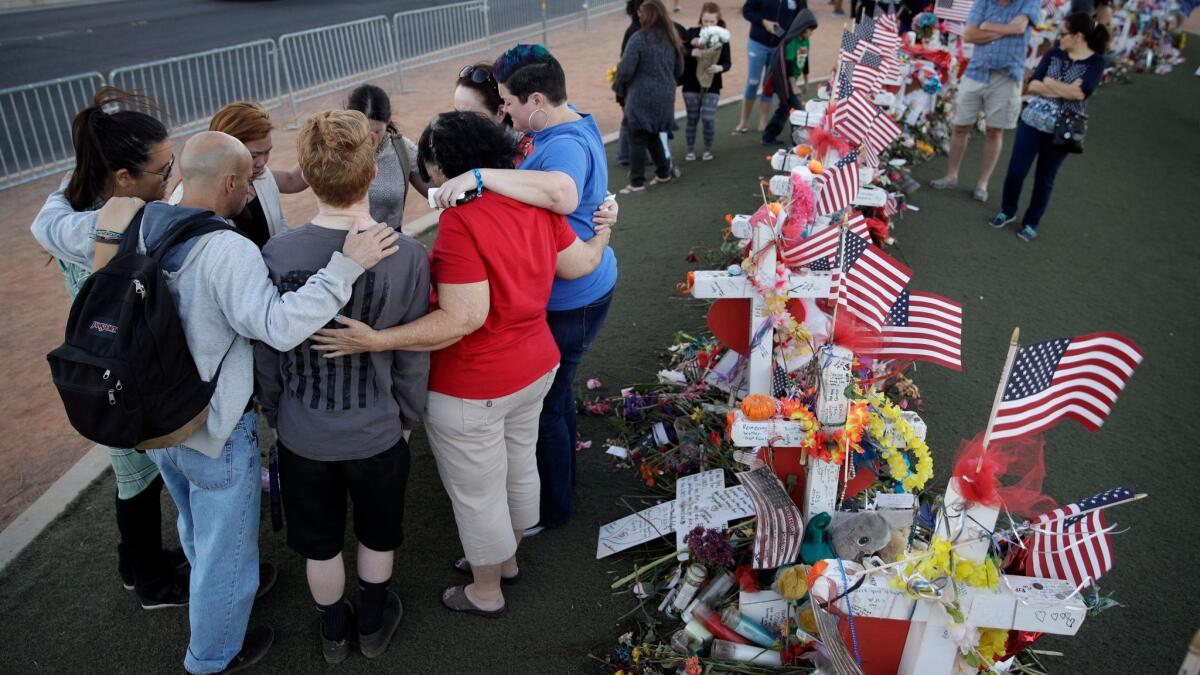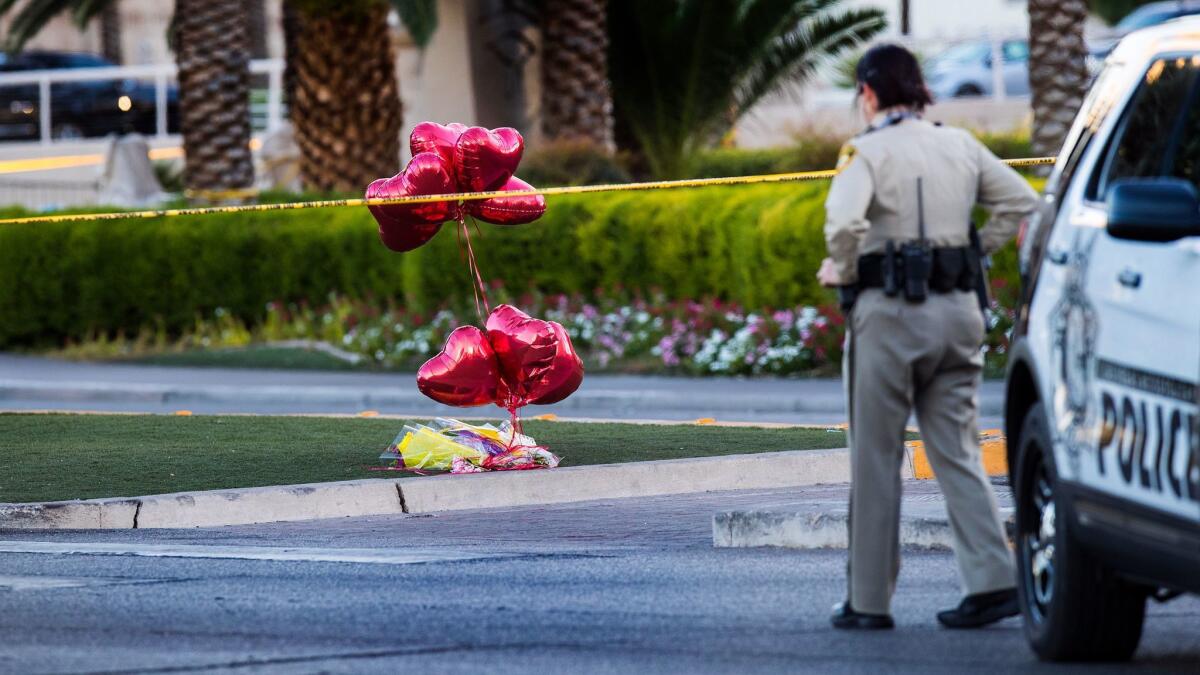What drove Las Vegas shooter to kill? We don’t know, and it drives us crazy

- Share via
We need to know.
Close to two weeks after 64-year-old Stephen Paddock rained down bullets on attendees of a country music festival in Las Vegas, killing 58 and injuring nearly 500 others, investigators are no closer to understanding the gunman’s motives.
For a nation riveted by the deadliest mass shooting in recent U.S. history, this is a deeply unsettling problem.
Police detectives and criminal profilers are working overtime in their efforts to dissect Paddock’s behavior, circumstances and psychological state in the lead-up to the shootings. Mental health professionals and experts on human behavior, meanwhile, are bearing witness to a more common and less mysterious response on the part of Americans: a sense that without an explanation for Paddock’s actions, we cannot psychologically close the chapter on this shooting.
“The lack of explanation here is bothering us on an almost existential level,” said psychologist Yuval Neria, an expert on post-traumatic stress disorder at Columbia University in New York. It’s an anguish Neria says he has heard in his lab and in his clinical practice, from people who have followed the unfolding horrors from afar and from those with direct ties to the shooting.
“It is an unconscious and profound human trait to seek a motive for catastrophic violence. It is a means of self-defense,” said Jeff Victoroff, a professor of psychiatry and neurology at USC and an expert in trauma, terrorism and human aggression. “People need to make contingency plans — to protect themselves — by assigning a motive, recognizing people with that motive, and staying away from them.”
As parents, we do this almost effortlessly to calm an anxious child. We put the threat at a distance. We cast the perpetrator as “other,” someone we could not possibly know. We promise our protection.
Now, parents and other adults have seen for themselves that concert-goers can be mowed down from 32 stories up. They may be forced to accept that an amiable-if-distant neighbor — a seemingly successful man with no known history of mental instability — can inexplicably kill people against whom he bears no apparent grudge.
“It’s unbearable,” said Victoroff. Without actionable answers that make Paddock a rare and distant monster, he said, “you are paralyzed.”
In humans, trauma awakens a powerful urge to “make meaning” — to explain what cannot readily be explained, said Columbia’s Neria. And national traumas, especially those stoked, magnified and spread by wall-to-wall media coverage, make that urge a widely shared need.
One of the hallmarks of PTSD is hypervigilance, Neria noted. That’s when a sufferer’s ability to distinguish safe places from dangerous ones has broken down. Unfortunately, the continuing gap in understanding about what drove Paddock to kill has eroded that distinction, he said. For many Americans, it is a taste of what life is like for those with PTSD.
Prayers and appeals to unity can fill the void that uncertainty creates. And sometimes, that’s enough, experts said.
We don’t feel safe until we know.
— Charles R. Figley, director of Tulane University’s Traumatology Institute

“We don’t feel safe until we know, and explanation abhors a vacuum,” said Charles R. Figley, a psychologist who directs Tulane University’s Traumatology Institute in New Orleans.
“People make up stuff,” Figley said. “That’s why we pray and ask God to protect us, to make sure that good people don’t get hurt. We start constructing explanations that at least make us feel better.”
In normal times, Figley said, this process gets an assist from public figures. People who feel threatened naturally gravitate to people they trust, he said — a community of people “like us.” In such instances, a leader’s “come together” message aims to shape and broaden that community. In the absence of a clear explanation for trauma — after a natural disaster, for instance — a leader’s words are meant to inspire confidence that, even in a random world, Americans can rely on each other.
But these are not normal times, Figley said. In a country riven by deep political and social divisions, the absence of an explanation for Paddock’s actions leaves many wondering, “Who’s on my side?” And in the absence of effective appeals to unity, he said he fears that anxious Americans will likely retreat more deeply into their partisan echo chambers.
President Trump has done little to bring Americans together and help them move forward, Figley said. Despite an absence of evidence, Trump pronounced Paddock “sick” and “demented.”
Trump’s characterization of Paddock as mentally ill may help the president feel better by providing a simplistic motive for the shooting, said Dr. David Spiegel, a Stanford University psychiatrist. But it is a poor response to a phenomenon that is actually quite easy to explain.
The reason Paddock could kill so many people in a 10-minute spasm is that he had ready access to the means to do so, Spiegel said. The real explanation, he said, lies with guns and a culture that puts “ridiculous firepower” in virtually anyone’s hands.
“There’s nothing sick about him,” Spiegel said of Paddock. “As a psychiatrist, I deeply resent the inference that anybody who does something like this is mentally ill. It’s untrue and deeply unfair to people with mental illness.”
Finally, Spiegel warns, when people reflexively accept a “mental illness” explanation for mass shootings, they are playing into the hands of the gun-rights advocates who would foil any effort to stem the tide of weapons in America.
“We all want to feel in control of things we can’t control,” said Spiegel, who directs Stanford’s Center on Stress and Health. “We want to play this narrative in our heads that we can avoid these people. But what’s really chilling is that no matter where you go or what you do, there’s a coldblooded guy with a gun who could take you out.”
Under the circumstances, he said, “we ought to be anxious.”
MORE IN SCIENCE
Beyond the orbit of Neptune, a dwarf planet is found to have a ring
‘Guns kill people,’ and leading doctors want to treat them like any other threat to public health
For fighting cybercrime and boosting internet security, UCSD’s Stefan Savage wins a MacArthur award







